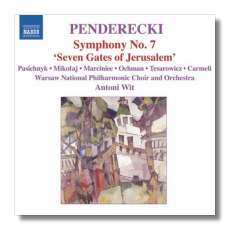
The Internet's Premier Classical Music Source
Related Links
- Penderecki Reviews
- Latest Reviews
- More Reviews
-
By Composer
-
Collections
DVD & Blu-ray
Books
Concert Reviews
Articles/Interviews
Software
Audio
Search Amazon
Recommended Links
Site News
 CD Review
CD Review
Krzysztof Penderecki

Symphony #7 "Seven Gates of Jerusalem"
- Olga Pasichnyk, Aga Mikolaj, sopranos
- Ewa Marciniec, alto
- Wieslaw Ochman, tenor
- Romuald Tesarowicz, bass
- Boris Carmeli, narrator
Warsaw National Philharmonic Choir and Orchestra/Antoni Wit
Naxos 8.557766 DDD 60:47
Composed in 1996 to celebrate the dawn of Jerusalem's third millennium, Penderecki's Seven Gates of Jerusalem (now included in his symphonic canon, although the composer resisted this idea early on) is an overwhelmingly powerful work. Penderecki took the texts mostly from the Book of Psalms, but there are excerpts from other Old Testament books as well, notably (in the sixth movement), Ezekiel. An understanding of the sung texts – Latin throughout, except in the sixth movement, which here is recited in Hebrew – is essential, and the CD's purchasers are directed to Naxos' website for texts and translations. Fair enough.
Early in his career, Penderecki earned a reputation as an experimenter, and he was on the forefront of the avant-garde movement in Eastern Europe in the 1960s. Since the 1970s, however, he has reined in his explorations into the nature of sound (in fact, two of his early orchestral scores were titled De Natura Sonoris), and has used innovation more as a means to an end than as the end itself. In other words, the Seventh Symphony is conservative compared to early works such as the Dies Irae and the Threnody for the Victims of Hiroshima. One could argue that Penderecki merely has capitulated to recent reactionary trends in classical music, but I believe that this composer acts on his own convictions. Although his style has changed over the past four decades, he continues to speak with the same voice. Devices heard in earlier works now are seamlessly integrated in the music as a whole, no longer calling attention to themselves.
The work is firmly anchored by its outer movements, both of them large-scale, awesome statements of the Lord's power and glory, and scored for the full complement of performers. Another critical point is reached in the third movement, a setting of the "De profundis" for unaccompanied chorus. (This movement was the composer's point of departure, when he set out to write this work.) The fifth movement is a huge setting of "Lauda Jerusalem," and here, one can hear how Penderecki has been influenced by Mahler, especially in the music's sinister undertones. An interesting feature of this movement is the use of tubaphones, which are percussion instruments devised by the composer. They are pipes of adjustable length (and therefore pitch), and they are played by striking them with "swatters" covered by felt. The aforementioned sixth movement gains great dramatic power through the force of the narration, and also through the use of the bass trumpet, which, for Penderecki, serves as the "voice of God." It is impossible to hear this symphony and not to feel awed, not just by the music, but also by the subject matter.
This, I believe, is the symphony's third recording, and the least expensive to date. Several of the soloists participated in the earlier recordings. These same soloists also sang in the symphony's Polish première. (The world première occurred, appropriately enough, in Jerusalem.) Also, the chorus and orchestra were the work's first performers in Poland, and with this recording, one could say that they have made the Seventh Symphony definitively their own. This is passionate music-making. It carries the listener along so strongly that he forgets that modern music is supposed to be difficult. This is not a compromising score in any sense, but its sincerity, and the dedication of the performers, should see even skittish listeners through. Naxos' outstanding engineering cuts no corners. Enthusiastically recommended!
Copyright © 2007, Raymond Tuttle




















